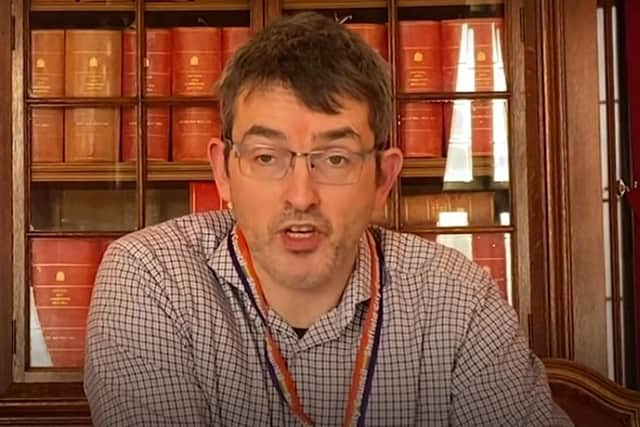Sheffield will 'bounce back' but needs to 'learn to live with Covid for years to come'
and live on Freeview channel 276
Greg Fell, Director of Public Health in Sheffield, welcomed the Government’s ‘roadmap’ to lifting lockdown when it was announced by the Prime Minister yesterday.
However, Mr Fell said that a complete return to normal was unlikely for a long time and urged caution so as to ensure that those who still have to wait for their vaccine do not get infected.
Advertisement
Hide AdAdvertisement
Hide AdHe said: “It is a good idea [to ease restrictions]. We can’t live in a state of lockdown forever.


"It is about releasing lockdown in a way that doesn’t lift all of the measures at once but does so in a carefully, so that at each stage we can test the impact.
"I am looking forward to a light at the end of the tunnel. I think the city will recover.
"Covid will undoubtedly have a long term and lasting impact, both socially and economically, but Sheffield will bounce back and we will need to help it do that.”
Advertisement
Hide AdAdvertisement
Hide AdIn spite of the positivity, Mr Fell warned that coming out of lockdown still poses significant risk even with the most vulnerable people vaccinated.
“The more we ease the lockdown the more risk there is of virus transmission,” he explained. “We want to avoid a surge in spikes.
“We now have a more vaccinated population, but there is still a substantial amount of unvaccinated people and there will be for a long time to come. Some of these are younger people who are less at risk, but can still be harmed by the virus.”
The number of new Covid-19 infections in Sheffield in the week to February 17 (the latest on record) showed a decline of 150 from the previous week. This trend is a continuation of a steady decline in new cases since the beginning of the lockdown after Christmas.
Advertisement
Hide AdAdvertisement
Hide AdConsidering whether this trend would be maintained while the restrictions eased, Mr Fell said: “I think it will probably get down to about 100 per 100,000 people and then flatline there.
"I don’t think it will get back to as low as it was in the summer, when it was 20 or 30 per 100,000 people.
"This is because the Kent variant is now the most common in the country, accounting for around 75 per cent of cases.
"This variant is more infectious and has a longer period where it is infectious than the original strain. This means more people will be infected.”
Advertisement
Hide AdAdvertisement
Hide AdScience has shown that the vaccine does offer both protection from the virus, and reduces the likelihood of a person transmitting to other people.
However, the fact that the virus is worldwide means that England will not be Covid free for a long time, Mr Fell said.
He elaborated: “For vaccine-induced herd immunity we need to get something in the order of 70 to 80 per cent of the entire population vaccinated.
"We are not doing that. Before the lockdown is lifted we are vaccinating everybody aged 50 and above and those in care homes or with underlying health conditions.
Advertisement
Hide AdAdvertisement
Hide Ad"This is because we would not be able to achieve herd immunity with the best will in the world; there will always be susceptible people around.
"This is why the notion of a zero Covid strategy is also not achievable. The reality is that the coronavirus will circulate around the world and it will keep mutating. We can reduce the risk of that but we cannot stop it, so it will be circulating for some years to come.
"I also think that the virus rates in the north are always going to be higher that in the south, mainly because of the difference in the economy.
"Up here we have more people in jobs that need to be done face to face - factories and manufacturing - whereas in the south east a to of people work in service industries where they can more easily work from home.
Advertisement
Hide AdAdvertisement
Hide Ad"That is just the way it will be. We can’t, and we shouldn’t change the economy.
"Although lockdown is coming to an end we have a long way to go and a lot more to learn. The end is not as nigh as we want.
"The lockdown period will give way to a period where people around the world will need to adapt to living with Covid for years to come.”
Yesterday (February 22) Boris Johnson addressed the Commons and laid out his ‘roadmap’ for how lockdown restrictions are expected to be eased in ‘steps’ between March and June.
Advertisement
Hide AdAdvertisement
Hide AdStep one, on 8 March, will see schools reopening and two people allowed to meet outdoors for a chat.
From 29 March outdoor gatherings of either six people or two households will be allowed, as will outdoor sports including golf, tennis and football.
Step two would see shops, hairdressers, gyms and outdoor hospitality reopening from 12 April in England.
Step three would start on 17 May with most social contact rules lifted, as well as limited mixing indoors including indoor hospitality with the ‘rule of six’ in place.
And the Prime Minister said that he hopes that step four, from 21 June, would see the end of all legal limits on social contact.